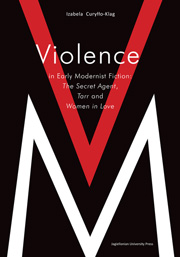Book contents
- Frontmatter
- Contents
- Acknowledgements
- Introduction
- CHAPTER I Modernist Consciousness of Crisis and the Emergent Violence Mythos
- CHAPTER II Ticking Towards Disaster—Violence as “The Enemy Within” in Conrad's The Secret Agent
- CHAPTER III “All Personality Was Catching”—Mimetic Rivalry and the Contagion of Violence in Tarr
- CHAPTER IV Humanity in a Cul-de-sac: Women in Love as an Epic of Sacrificial Crisis
- Conclusion
- Bibliography
CHAPTER I - Modernist Consciousness of Crisis and the Emergent Violence Mythos
Published online by Cambridge University Press: 05 September 2014
- Frontmatter
- Contents
- Acknowledgements
- Introduction
- CHAPTER I Modernist Consciousness of Crisis and the Emergent Violence Mythos
- CHAPTER II Ticking Towards Disaster—Violence as “The Enemy Within” in Conrad's The Secret Agent
- CHAPTER III “All Personality Was Catching”—Mimetic Rivalry and the Contagion of Violence in Tarr
- CHAPTER IV Humanity in a Cul-de-sac: Women in Love as an Epic of Sacrificial Crisis
- Conclusion
- Bibliography
Summary
What happens to tragedy in the twentieth century is not that it dies, but that it mutates into modernism. For a major strain of modernism belabours a middle-class society with which it nevertheless remains complicit, castigating the spiritually derelict condition from the right rather than the left. Modernism, too, can be rancorously anti-democratic, stridently elitist, homesick for the primitive and archaic, in thrall to spiritual absolutes which spell the death of liberal enlightenment. And if modernism lends the tragic impulse a new lease of life, it is not least because of the return of mythology. In the late modern era, mythical destiny shows its face again in the guise of vast, anonymous forces—language, will, power, history, production, desire—which live us far more than we live them.
Terry Eagleton, Sweet ViolenceModernism as Sacrificial Crisis
A recurrent theme foregrounded in critical discussions of modernism is a sense of crisis engendered by the process of dissociation from the great truths of the past epochs and by the impossibility of constructing a new system of reference that would allow for an equally efficient grasp of reality. As a result of the excessive pace of civilisattonal advancement at the turn of the twentieth century, traditional assumptions about the meaning of existence, the nature of society and the destiny of humanity lost their binding character, leaving people in a state of epistemological and ethical confusion.
- Type
- Chapter
- Information
- Violence in Early Modernist FictionThe Secret Agent, Tarr and Women in Love, pp. 12 - 30Publisher: Jagiellonian University PressPrint publication year: 2011



